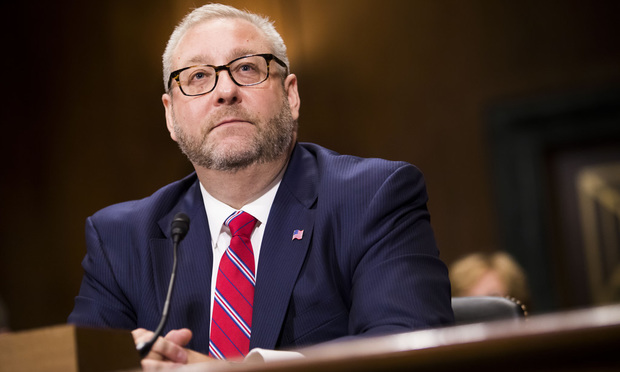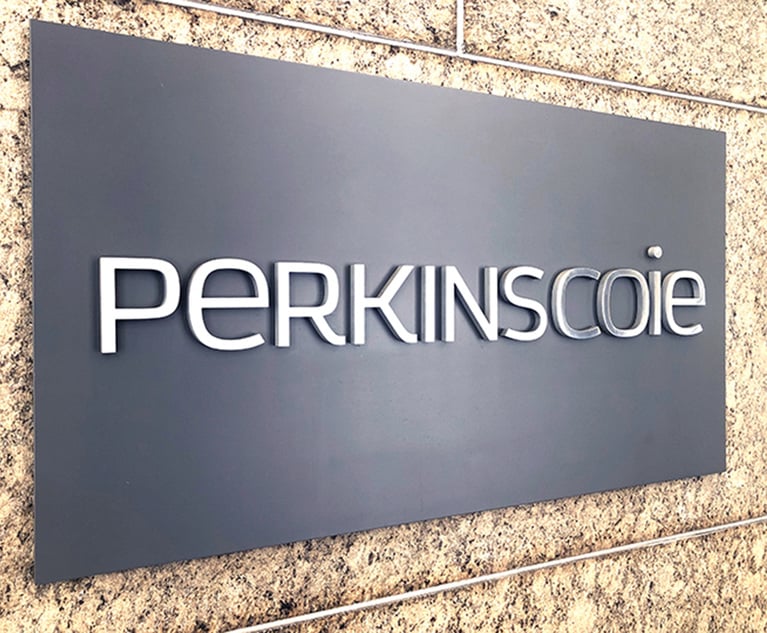DOJ's Brian Benczkowski Pledges 'Fair Shake' for Cooperating Companies
"Aggravating factors like high-level executive involvement in the misconduct will not necessarily preclude a declination," Brian Benczkowski, who leads the Justice Department's criminal division, said at a white-collar conference in New Orleans.
March 08, 2019 at 02:57 PM
5 minute read
 Brian Benczkowski testifies at his confirmation hearing in 2017. Credit: Diego M. Radzinschi / ALM
Brian Benczkowski testifies at his confirmation hearing in 2017. Credit: Diego M. Radzinschi / ALM
Companies that come forward to report misconduct to the government should know they will receive a “fair shake” from the U.S. Justice Department, the head of the criminal division said Friday, making the case for voluntary disclosure of corporate misdeeds.
Assistant Attorney General Brian Benczkowski, addressing a white-collar defense conference in New Orleans, pointed to a pair of recent corporate settlements as showcasing the benefits of voluntarily reporting corporate misconduct.
Benczkowski, who joined the Justice Department from Kirkland & Ellis last year, said the settlements with Cognizant Technology Solutions Corp. and the Insurance Corporation of Barbados conveyed that companies can avoid criminal charges even when aggravating factors, such as the involvement of executives, come into play.
In both cases, the Justice Department declined to bring charges against the companies and instead charged the high-level individuals, alleging that they violated the Foreign Corrupt Practices Act by authorizing bribe payments to government officials. Freshfields Bruckhaus Deringer represented the Insurance Corporation of Barbados, and lawyers from Latham & Watkins and DLA Piper represented Cognizant.
“These two cases make clear that aggravating factors like high-level executive involvement in the misconduct will not necessarily preclude a declination when the company's actions are otherwise exemplary,” Benczkowski said Friday, according to his prepared remarks.
➤➤ Our weekly briefing Compliance Hot Spots provides the latest news and trends in compliance and enforcement—what regulators are up to and how firms and in-house counsel are crafting new strategies. Learn more and sign up here.
Cognizant's board approached the government within two weeks of becoming aware the former president and chief legal officer had authorized bribe payments to an Indian government official to fast-track the construction of an office campus.
“Notwithstanding the fact that the misconduct reached the highest levels of the company, we declined prosecution. And we have made it clear why: The company voluntarily self-disclosed the conduct within two weeks of when the company's board learned of it,” Benczkowski said. “As a result, the department was able to identify the culpable individuals—and indeed, we have announced charges against the former president and the former chief legal officer of the company for their alleged involvement in the scheme.”
Here are other highlights from Benczkowski's remarks at the American Bar Association's 33rd annual National Institute on White Collar Crime.
>> Benczkowski doubles down against “piling on.” Here's what he said: “We want to avoid penalties imposed for a penalties' sake. If a company faces other civil or foreign penalties for the same misconduct, we will apply our 'anti-piling on' policy to reduce or apportion financial fines, forfeitures, and restitution between authorities to ensure that the overall outcome is equitable and just. We also will avoid penalties that disproportionately punish innocent employees, shareholders, customers, and other stakeholders.”
>> Mergers and acquisitions? No problem. Benczkowski affirmed that the Justice Department's approach to crediting self-disclosures would extend to misconduct uncovered in the process of a corporate merger or acquisition. “Applying the policy to the M&A context avoids chilling acquisition activity by law-abiding companies, who might otherwise walk away from worthwhile investments due to the risk of FCPA enforcement,” Benczkowski said. “After all, we want law-abiding companies with strong compliance cultures to be willing to make these kinds of acquisitions. Put another way, we don't want the good corporate actors to cede the field to higher-risk entities that may only perpetuate illegal conduct.”
>> Evaluating the effectiveness of compliance monitorships. Benczkowski said the Justice Department will soon provide training “with a focus on how we, as prosecutors, will evaluate the effectiveness of corporate compliance programs.” He envisioned the upcoming training session evolving into an annual program for white-collar prosecutors. “Training is, of course, step one in any effort to promote consistency in the exercise of prosecutorial discretion,” he added. In October, Benczkowski issued guidance that could curtail the settlement agreements that require companies to hire a compliance monitor. The guidance urged prosecutors to consider the “projected costs and burdens” of a compliance monitor when negotiating corporate settlements. Benczkowski said at the time he was not planning to hire a new designated compliance counsel to replace Hui Chen, who left the Justice Department in 2017. “Relying on a single person as the repository of all of our compliance expertise also is shortsighted from a management perspective,” Benczkowski said in October.
Read more:
William Barr Fills Front Office With Trump White House Lawyers
Jessie Liu's Women Lawyers' Group Opposed Alito—and 5 Other Things to Know
Ex-Kirkland Lawyers, Now at White House, Receive Ethics Waivers
DOJ Cites 'Full Cooperation' in Declining FCPA Case Against Plantronics
DOJ's New Compliance Monitor Guidance Accounts for 'Burdens' on Companies
This content has been archived. It is available through our partners, LexisNexis® and Bloomberg Law.
To view this content, please continue to their sites.
Not a Lexis Subscriber?
Subscribe Now
Not a Bloomberg Law Subscriber?
Subscribe Now
NOT FOR REPRINT
© 2025 ALM Global, LLC, All Rights Reserved. Request academic re-use from www.copyright.com. All other uses, submit a request to [email protected]. For more information visit Asset & Logo Licensing.
You Might Like
View All
Trump's DOJ Delays Releasing Jan. 6 FBI Agents List Under Consent Order
3 minute read
Judge Grills DOJ on Trump’s Birthright Citizenship Executive Order

Perkins Coie Backs Challenge to Trump's Ban on Transgender Military Service
4 minute read
Selendy Gay Files Lawsuit Challenging Trump's Workforce Reclassification EO
2 minute readTrending Stories
- 1ACC CLO Survey Waves Warning Flags for Boards
- 2States Accuse Trump of Thwarting Court's Funding Restoration Order
- 3Microsoft Becomes Latest Tech Company to Face Claims of Stealing Marketing Commissions From Influencers
- 4Coral Gables Attorney Busted for Stalking Lawyer
- 5Trump's DOJ Delays Releasing Jan. 6 FBI Agents List Under Consent Order
Who Got The Work
J. Brugh Lower of Gibbons has entered an appearance for industrial equipment supplier Devco Corporation in a pending trademark infringement lawsuit. The suit, accusing the defendant of selling knock-off Graco products, was filed Dec. 18 in New Jersey District Court by Rivkin Radler on behalf of Graco Inc. and Graco Minnesota. The case, assigned to U.S. District Judge Zahid N. Quraishi, is 3:24-cv-11294, Graco Inc. et al v. Devco Corporation.
Who Got The Work
Rebecca Maller-Stein and Kent A. Yalowitz of Arnold & Porter Kaye Scholer have entered their appearances for Hanaco Venture Capital and its executives, Lior Prosor and David Frankel, in a pending securities lawsuit. The action, filed on Dec. 24 in New York Southern District Court by Zell, Aron & Co. on behalf of Goldeneye Advisors, accuses the defendants of negligently and fraudulently managing the plaintiff's $1 million investment. The case, assigned to U.S. District Judge Vernon S. Broderick, is 1:24-cv-09918, Goldeneye Advisors, LLC v. Hanaco Venture Capital, Ltd. et al.
Who Got The Work
Attorneys from A&O Shearman has stepped in as defense counsel for Toronto-Dominion Bank and other defendants in a pending securities class action. The suit, filed Dec. 11 in New York Southern District Court by Bleichmar Fonti & Auld, accuses the defendants of concealing the bank's 'pervasive' deficiencies in regards to its compliance with the Bank Secrecy Act and the quality of its anti-money laundering controls. The case, assigned to U.S. District Judge Arun Subramanian, is 1:24-cv-09445, Gonzalez v. The Toronto-Dominion Bank et al.
Who Got The Work
Crown Castle International, a Pennsylvania company providing shared communications infrastructure, has turned to Luke D. Wolf of Gordon Rees Scully Mansukhani to fend off a pending breach-of-contract lawsuit. The court action, filed Nov. 25 in Michigan Eastern District Court by Hooper Hathaway PC on behalf of The Town Residences LLC, accuses Crown Castle of failing to transfer approximately $30,000 in utility payments from T-Mobile in breach of a roof-top lease and assignment agreement. The case, assigned to U.S. District Judge Susan K. Declercq, is 2:24-cv-13131, The Town Residences LLC v. T-Mobile US, Inc. et al.
Who Got The Work
Wilfred P. Coronato and Daniel M. Schwartz of McCarter & English have stepped in as defense counsel to Electrolux Home Products Inc. in a pending product liability lawsuit. The court action, filed Nov. 26 in New York Eastern District Court by Poulos Lopiccolo PC and Nagel Rice LLP on behalf of David Stern, alleges that the defendant's refrigerators’ drawers and shelving repeatedly break and fall apart within months after purchase. The case, assigned to U.S. District Judge Joan M. Azrack, is 2:24-cv-08204, Stern v. Electrolux Home Products, Inc.
Featured Firms
Law Offices of Gary Martin Hays & Associates, P.C.
(470) 294-1674
Law Offices of Mark E. Salomone
(857) 444-6468
Smith & Hassler
(713) 739-1250








